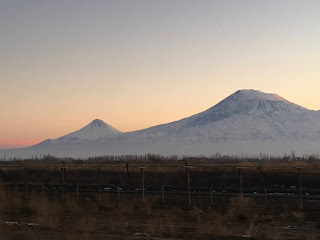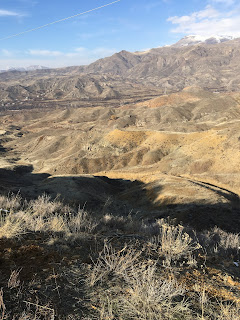Day 26 in Armenia; and, nearly 5 days since I last wrote...
Hello! This is my 26th day in Armenia. I spent 2 weeks in Yeghegnadzor, and now 11 days in Yerevan. (Your math is not incorrect: I needed to subtract a day because of time differences, travel, late night arrival, etc.) The contrast between how much I knew about the country when I first arrived and now is great, though I know full well that I have barely scratched the surface. If anything, I realize there is so much more I don't know, about anything.
Since I last wrote late at night on February 2nd, I passed a (negative) Covid test, met with some interesting people and received many different perspectives on the country and on life in general, considered how to help from Canada and while still here, got out of Yerevan (thankfully) for a day, moved to a new place... (there is enough fodder to write an individual blog post for each of these experiences...) but essentially, my mood hasn't changed in any fundamental way. I feel privileged, and terribly uncomfortable with it.
Central Yerevan is an ivory tower: it is easy to forget about the rest of the country here. I feel it is unfair that the poorest of the poor have little to look forward to. I understand (better) the desire to leave Armenia if one has no opportunity, which is the case for so many, too many, here (and my heart goes out to the youth, eyes glued to their phones where they are easily able to see the possibility of so much more...) I understand (better) how many regret that this is the case. I understand (better) how tired people are, how frustrated and impotent many feel, especially following the war. So many are disappointed, so many are in shock... although tourists are few, the cafés are full because spring is coming, sure, but I think people just want to forget their problems. Covid was painful for this country, but the war felt as though Armenia got... amputated. I don't think people yet know how to deal with their lost limb. Maybe this is a purely Diasporan opinion, but I don't think so.
A quick note on the war: it was against Azerbaijan, sure, but they had strategic help from Turkey, and possibly elsewhere (Israel at least). Armenia was pretty seriously screwed. As a Canadian, I should mention that the Turkish Bayrakdar drones used Canadian targeting technology (Wescam, Burlington) and rockets (Rotax, a Bombardier subsidiary in Austria). Those interested can read these recently published articles regarding Canadian technology, here and here (note: thanks to some good journalism and lobbying efforts, Canada (and Austria) apparently stopped supplying Turkey with the targeting components). Other segments for the drone were provided from U.S., U.K., Austrian and German corporations.
Still, overall, I mean, what was expected? Additional territory the size of Artsakh had been captured and remained part of Artsakh for a quarter of a century: the hundreds of thousands of Azeri villagers who were internally displaced as a result had children, I am guessing, who were raised with an intense hatred of Armenians. It reminds me (pardon any historical inaccuracies here, it's been a while since I've studied this...) of how the 1972 mass killings in Burundi (genocide perhaps) of Hutu by the Tutsi, instilled a virulent hatred in the children of the families of those Hutu, fleeing Burundi for Uganda in droves, and playing a part in the killing of Tutsi by Hutu extremists in the much better known 1994 Rwandan genocide. I have no proof nor facts nor numbers, but I bet that the hundreds of thousands of Azeris who fled were instilled with some serious racist and anti-Armenian sentiment, especially any children born soon after who, like the previous case mentioned, were "of military age", around 20-25 years after the first war. It should go without saying that such racism and hatred of Armenians is hardly new, either in Turkey or in Azerbaijan. Genocide denial is incredibly pervasive, of course... Should go without saying, but I am not sure what percentage of people outside the Armenian community actually know about this; certainly not in Turkey and especially in Azerbaijan, where if anything is taught about it at all it is falsehoods, even within schools.
So many I spoke to are looking for answers to what happened, what really happened, during this last truly horrendous year. Opinions abound, theories (conspiracy and otherwise) are thrown about liberally (this was probably always the case). The situation seems rife for extremist ideology to take hold. Those from the silver generation especially remember the good old days of the Soviets, when you might not have been able to protest; but at least, everyone ate. Nearly everyone I spoke to was dissatisfied with the current government. Then again, nearly everyone was also unsure of a better alternative. Winning a war may provide a nationalist burst, as it did during the first (1992-94) war, but losing this recent war means people are looking inwardly to find an enemy, people are wondering who stabbed them in the back.
I have meant to and avoided writing for 5 days now, partly because my last post (about donation spending) was the culmination of my reason for keeping this blog, but also because I just haven't felt like writing. It has been a privilege and great pleasure to keep this blog, both for posterity (for myself), but also to offer an inkling of what this Canadian-Armenian saw and felt while here, for those who care. However, it takes a lot of energy to do this for me, and I haven't had that energy lately. To be honest, I am looking forward to my flight home this Wednesday. Not least because those travel restrictions I wrote about once upon a time have not come to pass yet, i.e. the forced 3 day hotel stay and $2,000, which means I will be getting in under the wire. There is no set date yet: as this most recent article states, it could be this week or next month. So, I'd rather not take any chances by staying here longer: if I had stayed though, I almost certainly would return to Yeghegnadzor, or find some other place where I could provide some more "tangible" help. Unlike the last 11 days, really.
I miss my kids, yet of course I won't hug them when I return, for another two weeks (I'm not even sure I'll see them!), because doing so would mean they would need to be quarantined, too. I won't even be living at home, I will stay at a nearby empty apartment of a friend who is outside the country. The contrast of handling covid between both countries is striking: nothing is halted here, people are living as though nothing has changed, with incorrectly-worn masks hanging off chins, and store signs stating "no entry without masks" even with few doing so, the only evidences of covid having had any impact here. Interestingly, during the day about a third of the people walking the streets wear masks, in the evening it seems to be one in ten, if that. Nobody is wearing any in cafés, bars, clubs, except to enter (if that). Not all restaurants even force their staff to wear masks, especially evening spots. Most people have contracted it already, and are unaware or don't care that a new variant may well be on its way. There were many, many funerals a few months ago: sure, the war dead, but also the covid dead... memories sometimes need to be short, regrettably.
There is much more to say but my computer is dying, and I don't have my plug with me... I will end with a picture of a view of Ararat and Masis from yesterday (I add the wikipedia link for those who do not know why these mountains are the spiritual heartland of Armenia: how cruel, they are in another country...) one from pretty much as close as one can get to them, within Armenia.



Thank you for the photo of Masis and Sis (little Ararat). I am glad the fog has lifted, hopefully your spirits too.
ReplyDeleteAfter reading the article about Ararat in Wikipedia that you gave a link for, I would like to supplement the info with an Armenian tradition linked to the snow cover on these mountains. For instance: Thou shall NOT eat ձմերուկ (water-melons) before the snow on Sis has completely melted. This is in fact a very good indicator of the number of degree-days in a given season that would accurately predict when a fruit should be ripe enough to eat.